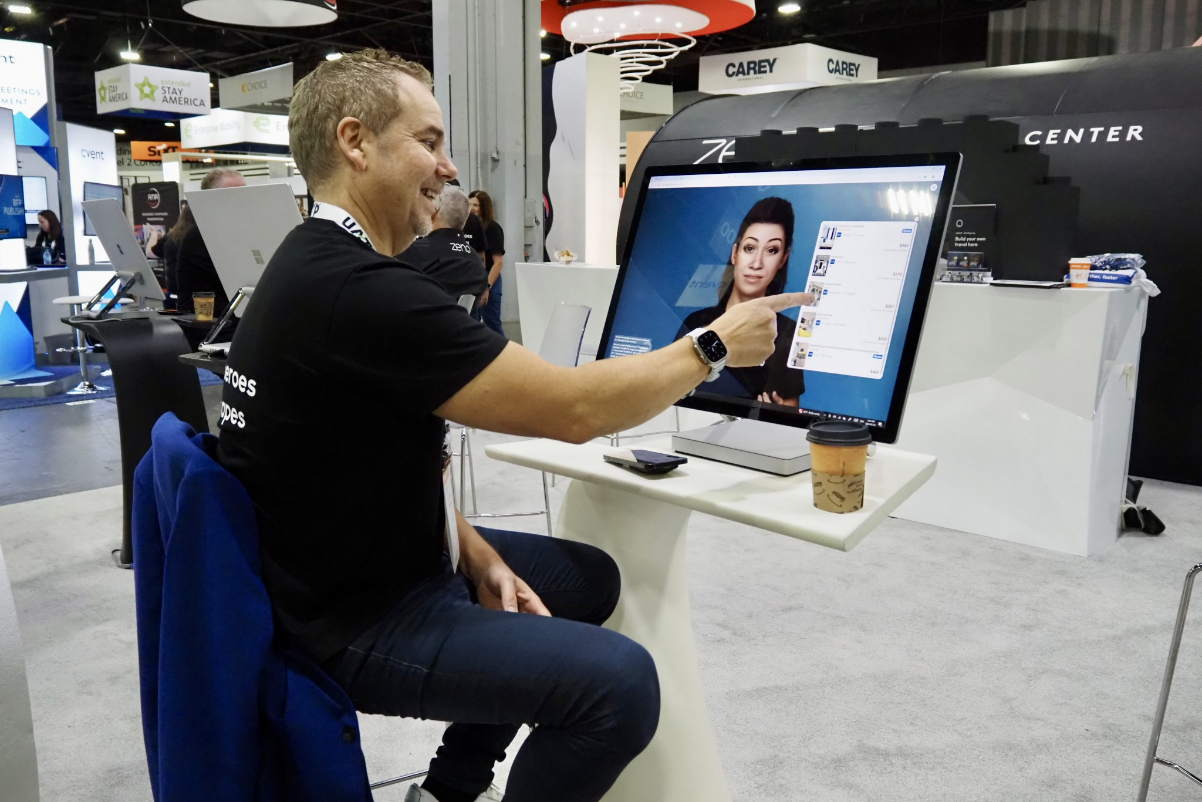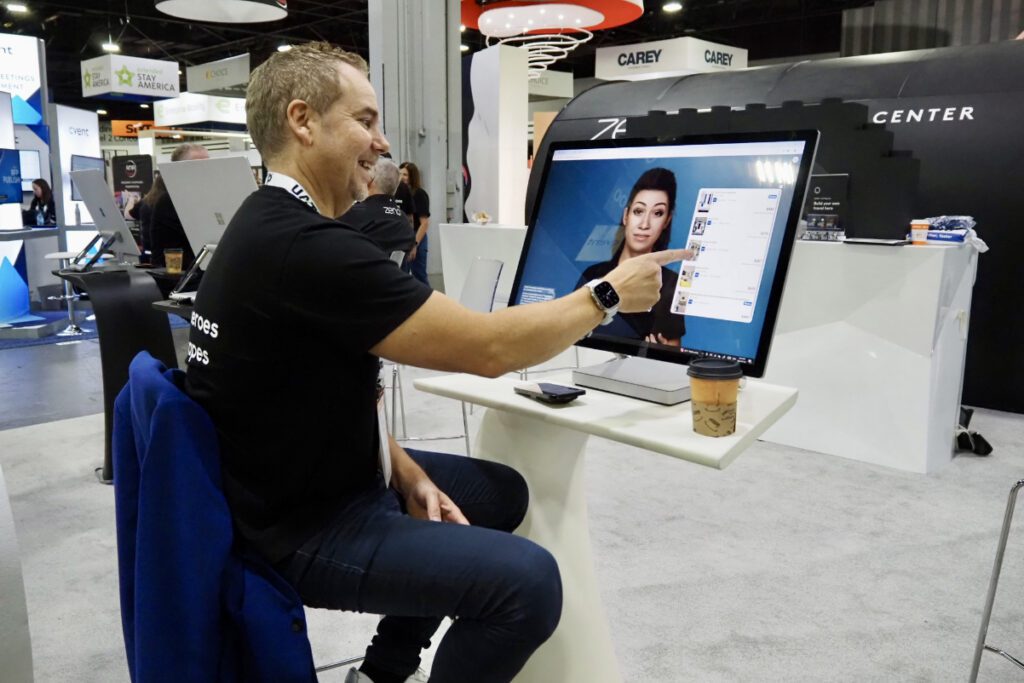
[ad_1]

Skift Take
Someday a computer-generated avatar may explain why you can’t fly business class to Dubai. In the meantime, travel management and travel tech companies are testing how to apply Gen AI to various parts of business travel.
Sean O’Neill
While the travel agent on the screen looked and sounded like a video game character, it asked and answered travel booking questions with a near-human speed. With the power of generative artificial intelligence (AI), the Zeno computer travel agent from tech company Serko talked me through relevant hotel suggestions for an upcoming trip.
I witnessed this demonstration of a live tool Wednesday at the Global Business Travel Association conference in Atlanta. It was one of many examples I saw of how innovations in generative AI are impacting corporate travel. The whole travel tech stack is getting the AI treatment — messaging, policy compliance, expense reports, and even rebooking during disruptions.
Below are some of the many AI applications to business travel processes I heard about from key companies on the convention floor.
1. Messaging
“Using Gen AI to answer traveler questions is really important because messaging can be an asynchronous channel where sometimes the traveler may put in a request but then look at the answer 20 minutes later and then ask a follow-up question,” said John Pelant, EVP, chief experience and technology officer at CWT, the travel management company.
“So being able to utilize Gen AI can make it much more efficient for the traveler to get prompt answers to standard questions as a supplement,” Pelant said. “But of course, it’s a supplement, and we still bring in a travel counselor with unique insight to address complex queries.”
2. Choosing travel options
Travelport, a tech company that provides reservation software for travel agents, this month introduced a feature called the Content Curation Layer (CCL). This feature uses AI to improve travel searches by quickly sorting through billions of options to find the best matches for customers.
The CCL is part of Travelport’s main platform and uses AI and machine learning to help travel agents compare flights, hotels, and car rentals more quickly. Travelport claims it works faster than typical airline search responses and helps identify the most relevant offers for each traveler.
3. Staying in compliance
Amex GBT is working on using Gen AI to extract information from a road warrior’s emailed request to book an itinerary.
The company is testing how to essentially input those details into its platform so that its online booking tool only displays travel options that comply with a road warrior’s travel policy. This removes the need for an advisor to read the email and input the information manually.
4. Expenses
Business travelers dread filing expense reports. When various tools sync, though, the process can be simpler. Tech integrations can enable suppliers, such as airlines and hotels, to send electronic receipts straight to the expense reports required by companies. Travelers can ideally just click to submit items via travel management software.
But most of the time today, there aren’t integrations. That’s where Gen AI can help, doing a better job at analyzing pictures that travelers take of their receipts than OCR (Optical Character Recognition) has been able to do on its own to date.
“No two receipts, even from the same hotel brand, look alike, and we’re now using GEN AI to more accurately capture details and match them to information travelers input,” said Charlie Sultan, president of Concur Travel. “The match rate is now orders of magnitude better than what it was.”
In short, Gen AI can reduce headaches, disputes, and delays when travelers file their expense reports. Many travelers dream of the process being fully automated.
Visa and travel documentation support is another area where Gen AI might similarly reduce the need to touch paper.
5. Recovering from travel disruptions
Altour, a travel management company run by Internova Travel Group, which is owned by Certares, debuted new AI-based tools related to helping travelers recover when their flights are delayed or canceled.
Altour’s new AI Predict tool is built to send predictive alerts about potential travel disruptions and delays, along with advice. A new AI Respond tool provides speedy responses to requests like booking confirmations and alternative options for flight cancellations when a traveler is attempting to rebook during a disruption.
6. Booking meeting venues
Groupize, a maker of software tools to help small businesses book meetings, released a new product last week that showed a novel use of AI.
Groupize Pro uses AI for venue information acquisition, helping event planners track what’s important at venues. The AI-powered feature aims to quickly gather and present relevant, up-to-date information about venues to platform users.
7. Educating about travel policies
Altour’s new product, AI Transform, is a tool meant to help with travel program compliance. It allows travel managers to create and update video content that is supposed to be especially persuasive at encouraging compliance with policies. The tool creates white-labeled mini-videos with supposedly life-like avatars explaining policies.
While it’s still early days, the concept is promising. People who become travel managers may not be trained in marketing skills for communicating a company’s travel policy in ways that encourage workers to understand and comply. Content created with the help of Gen AI could solve that challenge and offer the opportunity for instant language translation at corporations that span many countries.
Others also see the potential for AI to simplify travel policy comprehension and fare rule interpretation.
“Large language models are great for saying, ‘Hey, I need to fly to Paris next week. Can I fly in business class?’” Sultan from Concur Travel explained.
[ad_2]